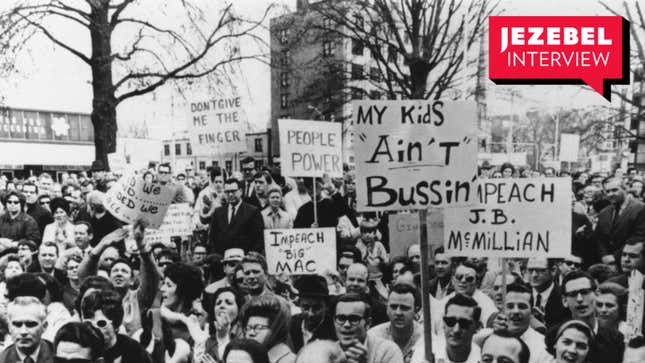On Busing, Joe Biden, and the 'Pervasiveness of White Backlash to School Desegregation'
Politics

The most widely discussed moment from last week’s Democratic primary debates was Kamala Harris’s pointed critique of Joe Biden’s defense of southern segregationists and his stance toward busing. That encounter—in which Harris shared her own story of being a young girl bused from her working-class neighborhood on the majority–black side of town to a predominantly white school in Berkeley Hills, and in which Biden appeared visibly flustered and defensive—has set off a round of media coverage and conversation about desegregation efforts more broadly and busing in particular.
One narrative that has stood out is that of busing as a “failed” strategy. “Busing has largely been seen as a failed effort,” wrote the New York Times in a piece that delved into Berkeley’s integration plan. It is, in the words of a Salon headline, “a semi-failed social experiment.” Those who believe this will point to the fact that schools today have largely resegregated after integration reached its high point in the late 1980s. And yet, is that a failure of the policy itself or is that the result of revanchist policies enacted after the successes of school integration? Those who have spent decades researching and writing about desegregation efforts largely agree with the latter.
A more realistic accounting of busing would have to take into consideration the overwhelming white backlash to school integration, which became synonymous with the coded phrase “forced busing” in the 1950s. To understand more of this history, Jezebel reached out to Brett Gadsden, a history professor at Northwestern University and the author of Between North and South: Delaware, Desegregation, and the Myth of American Sectionalism. Jezebel spoke with Gadsden about how to understand Biden’s position as part of white backlash to desegregation efforts, the ongoing resegregation of American life, and the reality that, as he put it, “racial segregation is the norm, not the exception.”
Our conversation has been condensed and lightly edited for clarity.
JEZEBEL: You’ve studied the fight for school desegregation in Delaware. What did that look like in the early 1970s when Joe Biden was coming up as a senator?
BRETT GADSDEN: In the early 1970s, civil rights activists filed a lawsuit against the state, contending that the racial segregation in Wilmington-areas schools was a function of state-sponsored education and housing policies, and the courts found that argument compelling. And through a succession of decisions, they arrived at the conclusion that the appropriate remedy was a two-way, inter-district busing plan that would transport essentially white kids from the suburbs into city schools and black kids from the city into suburban schools to integrate the metropolitan area public school systems. And this decision provoked a wave of consternation among particularly white suburbanites who feared that black students would bring with them all kinds of disciplinary problems and low academic standards that would undermine the schools and those communities. And they didn’t want to send their kids into the city. I think many perceived that the schools in Wilmington city had been in decline for some time and wanted to essentially insulate their children from that problem.
What do you make of Biden’s role at the time? Based on comments he made in the ’70s, he seemed to align fairly tightly with those white suburban parents opposed to desegregation through busing. I’m thinking specifically of when he said “the real problem with busing” is that “you take people who aren’t racist, people who are good citizens, who believe in equal education and opportunity, and you stunt their children’s intellectual growth by busing them to an inferior school… and you’re going to fill them with hatred.”
Biden was a freshman senator at the time, and he was channeling the sentiments of a great number of his constituents. And I think that’s the important context for his anti-busing work in the Senate, that Biden was right in step with many of his white constituents and whites across the nation who were facing the possibility of court-ordered school desegregation mandates.
Biden was right in step with many of his white constituents and whites across the nation who were facing the possibility of court-ordered school desegregation mandates.
What was your reaction when you heard Biden defend his work with segregationists and his anti-busing record?
-

-

-

-

-

-

-

-

-

-

-

-

-

-

-

-

-

-

-

-

-

-

-

-

-

-

-

-

-

-

-

-

-

-

-

-

-

-

-

-








































